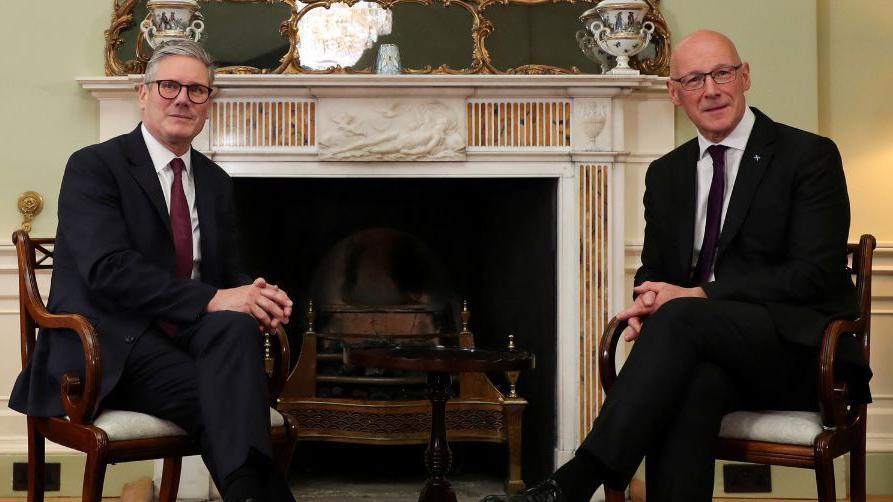Starmer and Swinney to work together on 'common ground'

Sir Keir Starmer and John Swinney met at Bute House
- Published
Prime Minister Sir Keir Starmer has met First Minister John Swinney for the first time since Labour's landslide election win.
Speaking after their meeting, the prime minister said his new government "got a clear mandate for change" in the election, and one thing that needed "reset" was the relationship between the Scottish and UK government.
"We are of a joint view that we can work constructively together," he said.
The new PM is touring the United Kingdom, and will next visit Wales and Northern Ireland before meeting mayors in England.
Mr Swinney said the pair had agreed to improving the relationship between their governments, which had been “very poor” under the last Conservative administration.
They committed to working collaboratively on areas of “common ground”, Mr Swinney said, including growing the economy, delivering net zero and improving public services.
Mr Swinney said he hoped Sir Keir was able to “fulfil” his commitment to reset the relationship.
John Swinney expects change to 'poor' Westminster relations
Sir Keir held a meeting with Mr Swinney at the first minister's official residence in Edinburgh.
The visit comes days after a dramatic upturn of Labour's fortunes in Scotland.
The party now has 37 of Scotland's 57 MPs - up from just one in 2019 - while the SNP's tally fell by 39, leaving them with just nine MPs at Westminster.
Scottish independence
On independence, the prime minister said there were "clearly differences" between them on constitutional issues.
Mr Swinney reiterated his support for independence, but acknowledged the SNP had to “reflect” on the result of the election.
Asked if the Scottish government still believed it had a mandate for an independence referendum, he said in 2021 the electorate voted "in favour of the objective of Scottish independence and the delivery of that independence through a referendum".
"I think the democratic will of the people of Scotland from that election should be respected,” he said.
A pro-Palestinian protest was held outside the official residence
Pro-Palestinian protesters staged a demonstration outside Bute House, where the meeting was taking place.
The leaders had been expected to pose for a picture at the front door.
However, due to the protest the prime minister entered and left via a back entrance.
Mr Swinney said they did not discuss the issue of Gaza but said the protest showed the “strength of feeling” on the issue.
He called for an immediate ceasefire, arms sales to Israel to end and for Palestine to be recognised as an independent state.
Labour will serve 'entirety of Scotland'
Before meeting Mr Swinney at Bute House, Sir Keir spoke at an event with Scottish Labour leader Anas Sarwar.
He said he would govern as “changed Labour”.
Sir Keir described the general election victory as part one of his party's plan, with part two coming when the next Holyrood election takes place in 2026.
The prime minister pledged to govern for everyone in Scotland, including those who did not vote for the party.
He said: “I asked people in Scotland, put their trust and faith in Labour. I said if they did so we would deliver for Scotland.”
Sir Keir added: “And that’s why I wanted to stand here today, to make good on that promise, to make good on that commitment at the first opportunity.”
Mr Sarwar also said the new UK government would "reset" devolution.
He told BBC Scotland's Sunday Show: "We are always going to put the country first before our own political party.
"So we will work with anyone and everyone to deliver for the Scottish people. And that's why Keir Starmer's first visit outside of Downing Street is coming to Scotland."
'We are going to reset devolution', Anas Sarwar says
Mr Sarwar was asked if the new Labour government would introduce a separate Scottish immigration system to allow workers to come to the country, using a distinct tax code, to address workforce shortages north of the border.
He replied: “No. We have to have one UK Border Agency. Of course we need one immigration system.”
He added: “But if you have two governments willing to work together, you can find distinct solutions for Scotland.”
He cited the example of the Fresh Talent initiative, introduced by the Labour-led Scottish executive 20 years ago, to address a declining population.
The scheme encouraged overseas graduates from Scottish universities to stay on working in Scotland.
For Sir Keir, this is a whistlestop tour to Scotland, Northern Ireland and Wales before meeting English mayors on Tuesday.
The message is pretty obvious - to stress the "United" in Kingdom.
But the work isn't over - the party now hopes to win control of the Scottish government from the SNP - in the 2026 Holyrood elections.
That means delivering the change Labour has promised Scottish voters as quickly as possible.
It will be a huge challenge when the party has pledged to stick to Conservative spending plans and some of its welfare polices.
The clock is already ticking.
In Westminster elections Scotland has now swung dramatically from Labour to the SNP and back again in less than a decade. That has led to some painful soul searching for supporters of Scottish independence.
But it’s also a reminder to Labour that voters can change their minds pretty quickly.

